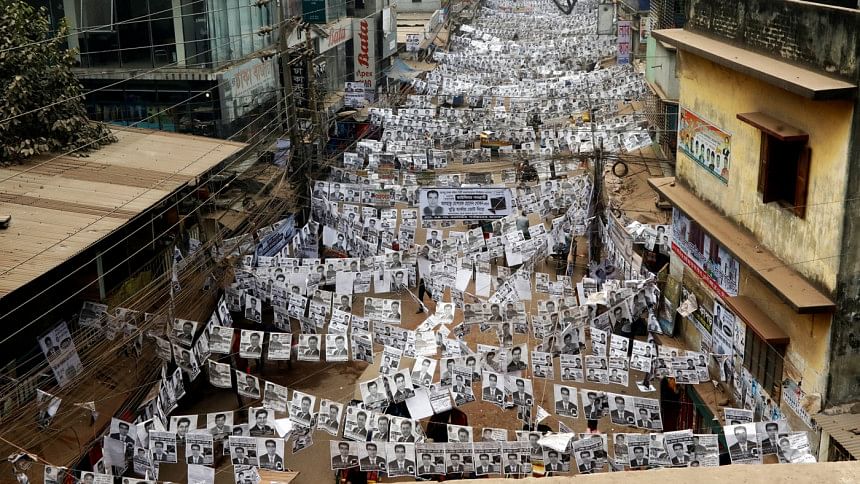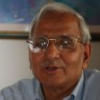Will the EC kindly answer?

The Election Commission, particularly the CEC, has been repeatedly assuring us that the upcoming elections of the two Dhaka city corporations will be free and fair. As citizens, we too want to be assured of credible elections, for "stolen" elections again may have disastrous consequences for our nation. But in order for us to be really assured, the commission must urgently respond to some questions and take some immediate steps to ensure its transparency and accountability as the existing constitutional scheme provides no such mechanism for our constitutionally independent EC.
First, in the past, the CEC had repeatedly said that EVMs would not be used in the national elections without a political consensus. Why, then, did the commission suddenly decide to spend nearly Tk 4,000 crore to purchase EVMs even though there was no budgetary allocation for such purchase and at least 12 registered political parties, including BNP, opposed their use? Why was the Voter Verifiable Paper Audit Trail (VVPAT) not included in our EVMs, defying the advice of Professor Jamilur Reza Choudhury, who was the head of the Technical Committee formed by the commission and who refused to sign the relevant document? It may be noted that with the inclusion of VVPAT, any voter could get a print-out showing whom she/he voted for, and the vote cast could be recounted, in case of disputes. It may also be pointed out that the EVMs used by India are now fitted with VVPAT—as directed by their Supreme Court in 2011—but our EVMs do not have the device despite being 11 times more expensive than theirs.
Second, in the last parliamentary election, election officers were allowed to override EVMs for up to 25 percent of voters, in case the control unit of the machines failed to verify their biometrics-based identity (BBC, November 24, 2018). In case of what percentage of voters was such overriding actually done? With this overriding authority, it should be noted, the election officers could conceivably cast votes for up to 25 percent of voters without their presence at the polling centres.
Third, the average vote casting rate was 51.42 percent in six centres where EVMs were used in the last national election. By contrast, in 294 centres where paper ballots were used, the average casting rate was 80.80 percent, showing a nearly 30 percent difference. Of the two, which is the true casting rate? There cannot be two correct rates of casting in the same election. How would the commission explain this difference? If the 51.42 percent casting rate is accurate, the 30 percent higher rate in 294 constituencies must be due to fraud and subject to be declared void. On the other hand, if the casting rate of 80.80 percent is accurate, there was likely voter suppression in the constituencies where EVMs were used, for which the commission must be held to account. In addition, why were the results of the constituencies where EVMs were used declared after midnight, although their results were instantaneously available? Why was the casting rate in Chattogram-8 only 22.94 percent despite a participatory election there?
Fourth, on the morning of December 30, 2018, the BBC showed the pictures of stuffed ballot boxes from Chattogram-10 as evidence of voting on the night before. Even the CEC indirectly admitted it later. The Transparency International Bangladesh (TIB) also raised serious allegations of vote rigging. Did the commission investigate these allegations and take any action against any offender?
Fifth, from the centre-wise election results published by the commission in response to my RTI application, we found that the vote casting rate was 100 percent in 213 centres, which was totally unrealistic given the death or absence of voters (for employment purposes) within or outside the constituency. Did the commission investigate the matter and take any action against anyone?
Sixth, from the centre-wise results, we found that BNP received zero votes in 1,185 centres, and Awami League in two centres. In addition, in 686 centres, Awami League candidates received all the votes. Such results are unbelievable and impossible. Furthermore, Hasan Mamun Rumi, a candidate from Chattogram-10, was shown to have received zero vote by the Returning Officer, but according to the centre-wise results, he received 283 votes, which amounts to a fraudulent change of results. How would the commission explain such anomalies?
Seventh, there were serious allegations of intimidation and violence against opposition candidates and voters during the 11th parliamentary election. A Prothom Alo report (December 29, 2018) indicated that there were 250 incidents of violence in 149 constituencies prior to the election. According to The Daily Star (December 27, 2018), there were 60 incidents of violence in the pre-election period. Furthermore, Dr Kamal Hossain and other opposition leaders were attacked. There were many written complaints against such violations of the electoral code of conduct and also about election results to the EC and the Electoral Inquiry Commission. Would the EC publish on its website the list of complaints and the remedies given?
Eighth, it is reported that the commission selectively appealed against the High Court decisions regarding the validity of candidature—in some cases, not in all. Will the commission disclose the list of such cases along with the names of lawyers?
Ninth, it has been reported that 74 cases were filed before the Election Tribunal, although till date no hearing took place in any of the cases. Since justice delayed is justice denied, will the commission approach the Tribunal to expeditiously hear these cases? Will the commission, in order to establish its own credibility, voluntarily initiate recounting of votes of the disputed constituencies?
Tenth, during the 11th parliamentary election, the CEC, the commissioners and officials divided among themselves the money earmarked for training, sometimes without participating in the training events themselves. Can the public servants, who are on government payroll, do so? What action did the commission take against such questionable payments?
Eleventh, there were allegations of "controlled" elections in Khulna and Gazipur city corporation elections. Prothom Alo and ATN News published videos of various electoral crimes during those elections. What actions did the commission take about these crimes?
Twelfth, it has been reported that the commission considered stopping the election of Barisal city corporation because of widespread booth capture, but decided not to do so to avoid possible violence. The commission later ordered re-election in nine wards for only councillors, following an investigation. Why did not the commission cancel the entire election? Will the commission publish the investigation report?
The commission may, in response to the above questions, claim that no one lodged complaints, which is not entirely true. More importantly, the commission's constitutional responsibility is to hold free and fair elections, and using such excuses represents the most blatant dereliction of their constitutional responsibility. The commission may also claim that after the publication of election results in the official gazette, they had no authority to do anything, which is also not true. Our courts in multiple judgments recognised that the commission has almost unlimited power, including "adding to the statutory rules," for the sake of free and fair elections [45DLR(AD)(1993)]. Unfortunately, the EC does not seem to realise the importance of its position.
Dr Badiul Alam Majumdar is Secretary, SHUJAN: Citizens for Good Governance.

 For all latest news, follow The Daily Star's Google News channel.
For all latest news, follow The Daily Star's Google News channel. 



Comments